Exhibition on sustainability of fisheries resources in Ilo - Moquegua, Peru
Chikipez a "tool to contribute to the sustainability of fisheries resources".
We note since several years a gradual decline of the available biomass of fish stocks at national level due to high fishing pressure. This results also in the decrease in the average size of the fishes in the catches and a significant increase of ever younger specimens. This affects the population structure of these species significantly, slows growth processes and jeopardises sustainability at population level.
It is important to raise awareness within the consumer public on issues of sustainability of fisheries resources, so that legally established minimum sizes of fishes in the catch are getting systematically respected, given that they correspond to the optimal size. This size gives the best biological and economic benefits, a situation that will achieve sustainability as R. Froese showed in a paper published in 2004.


You can look up the commercial fishes in the region of Moquegua in FishBase: Chilean silverside (Pejerrey - Odontesthes regia), Cabinza grunt (Cabinza - Isacia conceptionis), Lorna drum (Lorna - Sciaena deliciosa), Chilean jack mackerel (Jurel - Trachurus murphy), Chub mackerel (Caballa - Scomber japonicus peruanus), Peruvian rock seabass (Cabrilla - Paralabrax humeralis), Eastern Pacific Bonito (Bonito - Sarda chilensis).
Within this context, the Instituto del Mar del Peru (IMARPE), through the "Chikipez" fish ruler, supports the idea of sustainability. Using the Chikipez fish ruler will contribute directly to the conservation and optimum utilisation of the species, both nationally and internationally. Chikipez, is targeting the consumers of seafood products, retailers, industry authorities, media and fishing communities.
What did we do?
Ilo is in the south of the country, less than 200 km from the border with Chile. It is a busy fishing port.
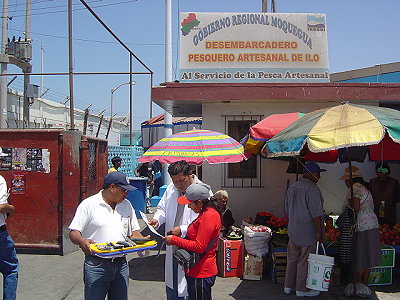 The meetings took place between 16 and December 17, 2010. Laboratory professionals of IMARPE in Ilo were involved with preparatory coordination to set up and use the facilities available, acquire the biological material and to agree in detail on how to conduct the practical exercises involved in the presentation of the Chikipez fish ruler. During those two days, the public activities were carried out in different places to engage people with scientific results which are directly relevant to their interests as citizens, producers and consumers.
The meetings took place between 16 and December 17, 2010. Laboratory professionals of IMARPE in Ilo were involved with preparatory coordination to set up and use the facilities available, acquire the biological material and to agree in detail on how to conduct the practical exercises involved in the presentation of the Chikipez fish ruler. During those two days, the public activities were carried out in different places to engage people with scientific results which are directly relevant to their interests as citizens, producers and consumers.
A specific presentation about the sustainability of resources and presentation of the Chikipez fish ruler attracted a lot of attention at the artisanal landing site in Ilo.
Consumers participated actively as the came to the place to purchase seafood products. All photos are courtesy from IMARPE.
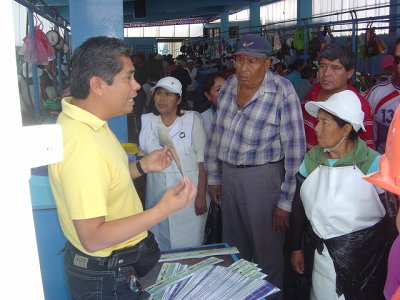 This gave them a direct hands-on understanding of the usefulness of the fish ruler to avoid buying baby-fish.
This gave them a direct hands-on understanding of the usefulness of the fish ruler to avoid buying baby-fish.
This could send a strong signal to the entire sector to catch only mature fish which had at least reproduced once – a clear insurance policy for healthy fisheries as well as for future availability of the popular fish species.
In the photo to the right, Jesús Rujel explains the principle of 'Chikipez'.
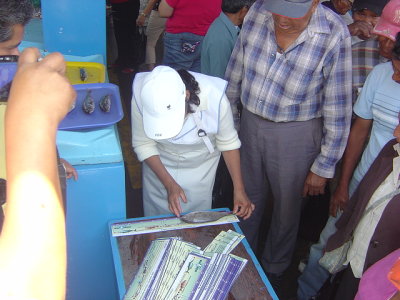 Then - do it yourself! Here you see one of the assistants of IMARPE in Ilo in action.
Then - do it yourself! Here you see one of the assistants of IMARPE in Ilo in action.
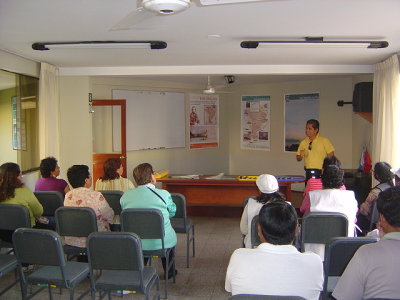 Another meeting was held in the auditorium of IMARPE - Ilo involving mothers as representatives of mothers' clubs in the town of Ilo.
Another meeting was held in the auditorium of IMARPE - Ilo involving mothers as representatives of mothers' clubs in the town of Ilo.
They all engaged enthusiastically in each of the activities developed.
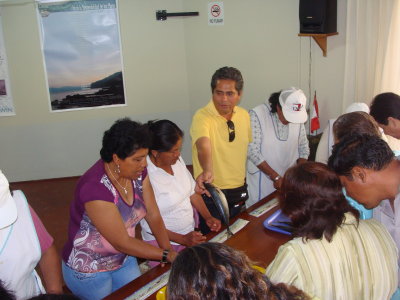 The women were also offered some practice to familiarise with the Chikipez fish ruler.
The women were also offered some practice to familiarise with the Chikipez fish ruler.
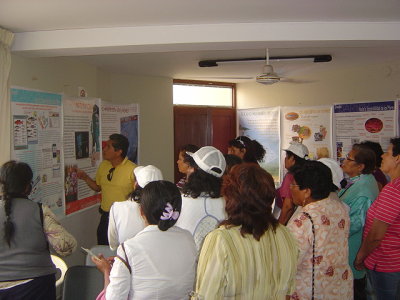 The posters of Mundus maris "From Darwin to Sustainable Seas" were again used as valuable pedagogical tools to encourage a broader perspective on the challenges in today's fisheries and our relationship to marine ecosystems around us.
The posters of Mundus maris "From Darwin to Sustainable Seas" were again used as valuable pedagogical tools to encourage a broader perspective on the challenges in today's fisheries and our relationship to marine ecosystems around us.
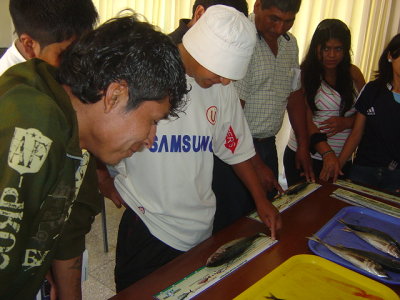 We also held a meeting with youth in the town of Ilo. The youngsters showed interest in the issue of resource sustainability and the importance of participation of consumers.
We also held a meeting with youth in the town of Ilo. The youngsters showed interest in the issue of resource sustainability and the importance of participation of consumers.
During the exhibition, Jesús explained that using the "Chikipez" fish ruler when buying fish, the consumer can be sure the fish he or she buys are adults.
The goal is not the "Chikipez" fish ruler itself, but to create awareness and inform the public about the problem of catching juvenile fish, bearing in mind the motto "Don't eat babies!".
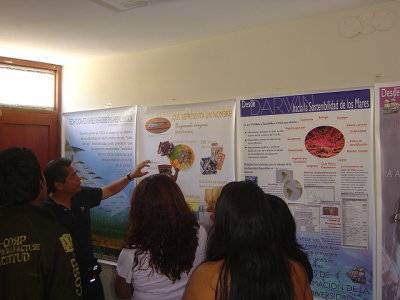 The introduction of the Chikipez fish ruler was again combined with a poster exhibition (“From Darwin to Sustainable Seas) by the NGO Mundus maris, which served to reinforce the message about sustainable fishery resources.
The introduction of the Chikipez fish ruler was again combined with a poster exhibition (“From Darwin to Sustainable Seas) by the NGO Mundus maris, which served to reinforce the message about sustainable fishery resources.
Thanks to the invitation of the Regional News Channel Telesur, we were able reach many more people with the information on the presentations of the Chikipez fish ruler and its use in seeking to achieve resource sustainability.
Upon completion of the events, participants suggested that such activities should take place frequently, in order to raise awareness of ever more consumers and to engage resolutely in search of achieving sustainability of fishery resources in the town of Ilo.
Jesús Gerardo Rujel Mena, Biologist









